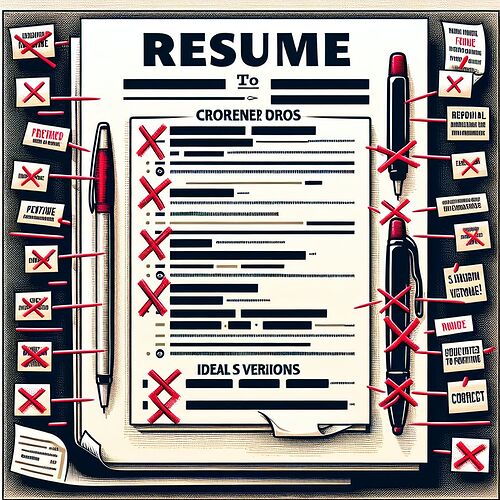Resume Mistakes to Avoid for a Professional Image
Your resume is often the first impression a potential employer has of you. It's crucial to make sure your resume presents you in the best possible light and showcases your skills and qualifications. To help you create a professional image, here are some common resume mistakes to avoid:
- Spelling and Grammar Errors
- Irrelevant Information
- Formatting Inconsistencies
- Using an Unprofessional Email Address
- Not Tailoring Your Resume to the Job
- Including Personal Information
- Exaggerating or Lying
- Not Including Results or Achievements
- Using a Generic Objective Statement
- Not Proofreading
1. Spelling and Grammar Errors
Spelling and grammar mistakes can make your resume look unprofessional and careless. It's essential to thoroughly proofread your resume and use tools like spell check and grammar check to catch any errors. Additionally, consider asking a friend or family member to review your resume for any mistakes you may have missed.
For example, instead of writing 'exellent communication skills,' the correct spelling is 'excellent communication skills.' Small mistakes like these can make a big difference in how your resume is perceived.
2. Irrelevant Information
Including irrelevant information on your resume can clutter the document and distract from your most important qualifications. Make sure to only include information that is directly relevant to the job you are applying for. This includes your work experience, education, skills, and any certifications or professional affiliations that are relevant to the position.
For instance, if you are applying for a marketing position, it's not necessary to include details about your high school job as a lifeguard. Instead, focus on highlighting your relevant marketing experience and skills.
3. Formatting Inconsistencies
A well-formatted resume is visually appealing and easy to read. Inconsistencies in formatting can make your resume look unprofessional and disorganized. Make sure to use consistent fonts, font sizes, and formatting styles throughout your resume. Pay attention to details such as bullet points, margins, and spacing.
For example, if you use a certain font and font size for your section headings, make sure to use the same font and font size for all section headings.
4. Using an Unprofessional Email Address
Your email address is often one of the first things an employer sees on your resume. Make sure to use a professional email address that includes your name or initials. Avoid using email addresses that are unprofessional or inappropriate.
For example, instead of using 'partygirl123@gmail.com,' consider using 'johndoe@gmail.com' or 'jdoe123@gmail.com.'
5. Not Tailoring Your Resume to the Job
Each job you apply for may require different skills and qualifications. It's important to tailor your resume to each specific job by highlighting the most relevant experiences and skills. Review the job description and customize your resume to match the keywords and requirements mentioned in the job posting.
For instance, if the job description emphasizes the need for strong project management skills, make sure to highlight your project management experience and skills in your resume.
6. Including Personal Information
Personal information such as your age, marital status, and hobbies is generally not relevant to your qualifications for a job. Including this information can create bias and may lead to discrimination. Stick to including professional information that is directly related to the job.
For example, it's not necessary to include your date of birth or your hobbies on your resume. Instead, focus on showcasing your relevant work experience and skills.
7. Exaggerating or Lying
It can be tempting to exaggerate or lie on your resume to make yourself appear more qualified for a job. However, this can have serious consequences if you are caught. Employers often verify the information on resumes, and dishonesty can lead to loss of job opportunities and damage to your professional reputation.
Always be truthful and honest on your resume. Instead of exaggerating, focus on highlighting your genuine accomplishments and qualifications.
8. Not Including Results or Achievements
Employers are interested in seeing the results and achievements you have accomplished in your previous roles. Instead of simply listing your job duties, include specific examples of how you made a positive impact in your previous positions. Quantify your achievements whenever possible, such as by including numbers, percentages, or specific outcomes.
For example, instead of saying 'Managed a team of employees,' you could say 'Managed a team of 10 employees, resulting in a 20% increase in productivity.'
9. Using a Generic Objective Statement
A generic objective statement at the beginning of your resume can be vague and uninteresting to employers. Instead, consider using a professional summary or profile that highlights your key qualifications and accomplishments. This allows employers to quickly see what you can bring to the table.
For instance, instead of saying 'Seeking a challenging position in a dynamic company,' you could say 'Results-driven marketing professional with 5 years of experience in developing and executing successful marketing campaigns.'
10. Not Proofreading
Proofreading is essential to catch any errors or typos in your resume. Even small mistakes can create a negative impression. Take the time to carefully review your resume for any errors before submitting it.
For example, instead of saying 'experiance,' the correct spelling is 'experience.'
Avoiding these common resume mistakes will help you create a professional image and increase your chances of landing an interview. Remember to always tailor your resume to each specific job and showcase your relevant skills and qualifications.
Did I miss anything? Add your comments below!
